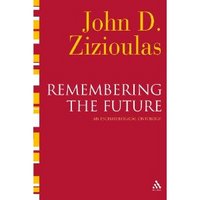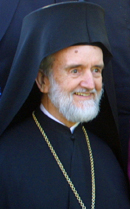A new book is available from the eminent theologian and bishop, John Zizioulas, Remembering the Future: An Eschatological Ontology (T&T Clark International, Continuum, 2013). I very much enjoy the thinking and the challenge of Zizioulas.
From the publisher...
 The predominating concept in theological ontology is
that of a protological ontology which defines being itself as being defined by
the past. The future of things in this perspective is defined by its origins
and the "given" or the "factum". In this major new book
John Zizioulas shows that eschatology can have important implications for
ontology, i.e. for being itself. The world was created with a purpose and the
end which would be greater than the beginning. This is the view of the Fathers,
such as Irenaeus and Maximus, who made the end the "cause of all
being". The implications of such an idea are revolutionary, both
historically and experientially. It represents a reversal of the ancient
philosophical idea of causality as well as of our common sense rationality,
according to which the cause precedes chronologically as well as logically. It
is the opposite of protological ontology, which makes the past decisive for the
future. Eschatological ontology, therefore, is about the liberation of being
from necessity, it is about the formation of being. Man and the world are no
longer imprisoned in their past, in sin, decay and death. The past is
ontologically affirmed only in so far as it contributes to the end, to the
coming of the kingdom. The eschaton will 'judge' history with this criterion
alone. The last judgment as part of the eschaton represents an ontological, not
a moral event. Zizioulas shows how this eschatological ontology permeates
Christian doctrine, particularly that of creation and ecclesiology. He also
points out some of its ethical implications.
The predominating concept in theological ontology is
that of a protological ontology which defines being itself as being defined by
the past. The future of things in this perspective is defined by its origins
and the "given" or the "factum". In this major new book
John Zizioulas shows that eschatology can have important implications for
ontology, i.e. for being itself. The world was created with a purpose and the
end which would be greater than the beginning. This is the view of the Fathers,
such as Irenaeus and Maximus, who made the end the "cause of all
being". The implications of such an idea are revolutionary, both
historically and experientially. It represents a reversal of the ancient
philosophical idea of causality as well as of our common sense rationality,
according to which the cause precedes chronologically as well as logically. It
is the opposite of protological ontology, which makes the past decisive for the
future. Eschatological ontology, therefore, is about the liberation of being
from necessity, it is about the formation of being. Man and the world are no
longer imprisoned in their past, in sin, decay and death. The past is
ontologically affirmed only in so far as it contributes to the end, to the
coming of the kingdom. The eschaton will 'judge' history with this criterion
alone. The last judgment as part of the eschaton represents an ontological, not
a moral event. Zizioulas shows how this eschatological ontology permeates
Christian doctrine, particularly that of creation and ecclesiology. He also
points out some of its ethical implications.About

John D. Zizioulas, 81,
Metropolitan of Pergamon, was Professor of Systematic Theology at the
University of Glasgow and Visiting Professor at King's College, London. His
thinking is widely respected across confessional lines. The key points of his
thinking, I believe, are freedom (human and divine), ontology and otherness (personhood),
communion theology, one and the many, and the contours of Christian unity.
Zizioulas is the author at least 8 books and numerous articles. He is the
Orthodox voice in ecumenical discussions especially between Rome and
Constantinople. Since 1986 John Zizioulas has been a bishop.



Just a quick note that Nicholas Healy wrote a fabulous book on the same subject (creation, ontology, eschatology) that sounds like it has a lot in common with this one. It was published by Oxford University Press in 2005 and is called "The Eschatology of Hans Urs von Balthasar: Being as Communion." Seems like the two books would make a good pair, one from the Orthodox side and one from the Roman Catholic side....
Mary